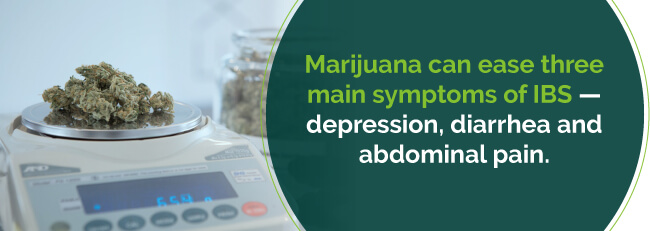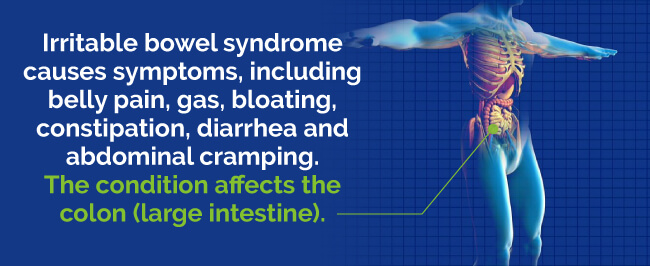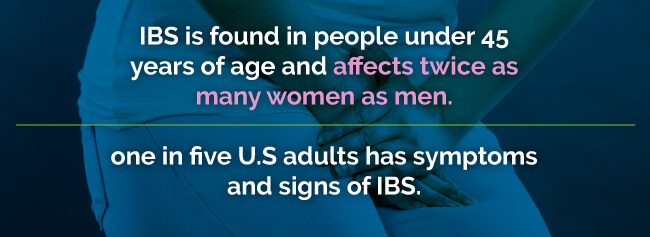
Irritable bowel syndrome (IBS) is a painful, chronic condition that causes changes in your bowel habits. Familiar IBS symptoms of gas and bloating, along with alternating episodes of diarrhea and constipation, can get you down. It can also be embarrassing. You may also be worried about being too far away from home in case you need to use the bathroom.
We look at what IBS is, its history, symptoms and effects in this article. Perhaps most importantly, we find out about conventional treatments for the condition and how marijuana can treat your symptoms naturally.
Exciting research is being carried out in the field of medical marijuana for irritable bowel syndrome. Some evidence suggests that your body’s endocannabinoids , the molecules in your body that resemble compounds found in pot, could help limit intestinal inflammation. People with IBD have higher levels of cannabinoid receptors in their colon. There have been some small studies that show many patients take medical cannabis for irritable bowel syndrome symptoms.
Find A Doctor Find A Dispensary
Even though cannabis and irritable bowel syndrome research and treatment recommendations are still in their infancy, there are ways pot can improve your quality of life. Marijuana can ease three main symptoms of IBS — depression, diarrhea and abdominal pain.

IBS affects your mental well-being. Cannabis is a well-known mood lifter. Just a little can make you feel far more positive. A study published in April 2016 in the journal Neuropharmacology discovered a non-psychoactive substance in pot, cannabidiol (CBD), eases anxiety and antisocial behaviors in rodents in minutes. The effects continued to work over time. Conventional antidepressants can take weeks to work. Cannabis could work wonders for you if you feel depressed as a result of your illness.
Diarrhea is a debilitating, painful and embarrassing symptom of IBS. Cannabis has been shown to help with diarrhea by reducing the rate food moves through your gastrointestinal tract while minimizing abdominal cramping.
A study published in the British Journal of Pharmacology suggests cannabinoid treatments can help manage diseases like IBS. Pot is both anti-inflammatory and works well at alleviating nerve pain. Another study points to cannabinoid treatments calming intestinal lining inflammation and sensitivity in people with GI problems.
We’ve put together a quick beginner’s guide to illustrate some of the benefits of taking medical pot for irritable bowel syndrome and the strains to consider.
Depression is a tricky part of dealing with chronic illness. Pot is a natural alternative if you don’t want to deal with the often serious side effects of antidepressants. Helpful strains include:
Diarrhea is an uncomfortable and embarrassing symptom of irritable bowel syndrome. Diet can control this symptom to an extent. But taking medical pot can help if you’re suffering from a severe bout of diarrhea. Helpful strains for this symptom include:
It’s exhausting when you suffer from chronic abdominal pain. Medical pot is a natural choice when you don’t want to experience the side effects of painkillers. Some helpful painkilling strains include:
Now that you know about some of the most effective strains of medical cannabis for a spastic colon, you need to know how to take it. You can take marijuana in various ways, including:

Taking medical pot doesn’t need to mean smoking a joint. There are many far less obvious ways of taking medical cannabis for IBS whenever you need to. You can reduce your symptoms of IBS by eating the correct diet.
You can reduce your symptoms of IBS by eating the correct diet. It’s a good idea to keep a food journal to help you pinpoint the foods that trigger an attack. You should bring your journal along to doctor’s appointments so you can discuss your findings. Your physician may recommend you see a dietician to help you make changes to your usual diet.
The best way to help yourself if you have IBS is to work on changing your diet. Steer clear of foods that make you feel unwell. Fiber is helpful as it improves your intestinal functions. Bear in mind that you need to maintain a balanced diet that provides you with enough calories and energy to stay well. You might need to take supplements if you need to exclude entire food groups because of your condition.
Fiber is useful for decreasing pain and bloating. It enables your stools to pass with greater ease. Foods like whole-grain breads, whole-grain cereals, vegetables and fruit are good sources of fiber. Add the following foods into your diet slowly. Note how you react to them:
To ensure you get the fiber you need, you can also buy supplements. As you increase your fiber intake, be sure to drink more water and decaffeinated beverages. Between six and eight glasses a day is best. Do enough exercise, too. Moving can help relieve your symptoms. You can also try adding probiotic yogurts or supplements into your diet.
Having irritable bowel syndrome is often confusing. You may still be trying to figure out your triggers. You could be struggling with certain specific symptoms. Thankfully, medical pot offers you real and gentle relief from your symptoms. Now that you know more about the benefits of medical marijuana for irritable bowel syndrome, it’s time to take control of your condition and search for a medical marijuana doctor or dispensary today.
Find A Doctor Find A Dispensary
Irritable bowel syndrome is a common gastrointestinal (GI) disorder that causes you to have a mix of GI symptoms, including belly pain, gas, bloating, constipation, diarrhea and abdominal cramping. The condition affects the colon (large intestine).

IBS is referred to as other names, including:
Most people who have IBS have only mild or moderate symptoms. Only a small fraction of individuals who have a spastic colon experience severe symptoms. Most IBS sufferers can manage their symptoms through adjustments to their stress levels, diets and lifestyles. Other people find that they need medication or alternative therapies, such as cannabis.
There is currently no cure for irritable bowel syndrome. However, many IBS sufferers figure out ways of living that make them feel better over time. They may also pinpoint what makes them feel worse to help them manage their symptoms.
In older documents, names used to describe IBS included:
One of the first known references to irritable bowel syndrome appeared in 1950 in the Rocky Mountain Medical Journal. The term was used in relation to patients who developed constipation, diarrhea and abdominal pain with no real known infective cause. Some early theories pointed to IBS having a mental or psychosomatic cause.
Symptoms and signs of IBS vary widely from person to person. These can often resemble the symptoms of other conditions. The most common symptoms to expect include:
IBS is often a chronic condition. It’s likely there will be times when your symptoms are better or worse than others. You may even have periods where your symptoms show a marked improvement or disappear entirely.
It’s crucial to see your doctor if you have a persistent change in your bowel habits or if you feel you’re exhibiting any other signs of IBS. You need to rule out any more serious, underlying conditions. Symptoms that may indicate you could have a more serious health problem include:
Having IBS is painful, and it can cause you to change the way you live your life. When you’re suffering from a bout, you may withdraw from your usual everyday activities due to long-lasting pain and discomfort. You might not want to travel too far from home in case you suffer from a diarrhea attack. These often come on very quickly as if out of nowhere.
The gas you experience stops you from socializing due to a fear of being humiliated. Conventional medications often don’t give you the relief you need, and there are side effects to consider. You find that you feel jittery, angry and short-tempered from certain medications you may be taking. You may begin to avoid eating or drinking to stop your symptoms from occurring when you’re out and about or even at home. Pain zaps your get-up-and-go and drains your motivation.
For some people, IBS is an invisible condition. That is, when you have it, you can look perfectly healthy. Other people often won’t believe that you’re ill because you don’t look sick. You may then feel further removed from those around you. Because friends and family cannot fully understand what you’re going through, they may get tired inviting you places as you never have the energy to accept the invitations, particularly if you have chronic IBS or a severe case of the condition.
If you recognize yourself in these words, there is hope. Medical marijuana can help you.
As you can see from the following statistics, irritable bowel syndrome is a common disease:

Different people have different IBS triggers. Things that often make symptoms worse include:
You can manage your symptoms with a combination of treatments and by changing your diet. Minimizing stress can also help. You usually need to try a few treatments to find out what works best for you. Let’s take a look at the current treatments available.
Your doctor may recommend you try some of the following medicines to relieve your spastic colon symptoms:
When taken over a protracted period, many of these drugs cause side effects. For example, abruptly stopping antidepressants can cause withdrawal symptoms. Side effects of antidepressants include:
Antidepressants can even make you feel suicidal in the worst-case scenario. Both antidepressants and antispasmodics can worsen constipation. Muscle relaxants are prescribed in these cases. Unfortunately, muscle relaxants contain a mild sedative that can be habit forming. Even fiber supplements and laxatives can have adverse effects. Some people report worsened gas and bloating from supplements. Laxatives can be habit forming when used too often. Some people report nausea as a side effect of taking peppermint capsules.
Other conventional IBS treatments include:
More and more people are turning to medical pot to relieve their IBS symptoms. Marijuana is a natural and gentle way of treating irritable bowel syndrome. Let’s find out more in the next section.